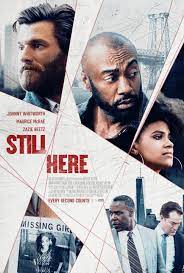
STILL HERE
US, 2020, 99 minutes, Colour.
Johnny Whitworth, Maurice McRae, Ashton Williamson, Jared Kemp, Zazie Beetz, Ashton Williamson, Larry Pyne, Jeremy Holm, Stephen Hauck, Danny Johnson, Justiin A Davies.
Directed by Vlad Feier.
Still Here is based on a true story, with a focus on the disappearance of children all over the United States, abductions, abuse, murders.
The film was written and directed by Romanian-born director who moved to the US, Vlad Feier. While it plays as a drama, it also has strong overtones of popular crime-investigation programs.
There are three focuses of the narrative, opening with an African-American worker, delighting in playing with his young daughter, then experiencing the mystery of her disappearance, the actor Maurice McRae able to communicate an extraordinary amount of grief, incessant search for his daughter, going for days putting up notices and handing out photos of his daughter to the local inhabitants. And, he and his wife, with their distraught teenage son, feel of the police are not doing anything.
The second focus of the narrative is on a young journalist, Johnny Whitworth, criticised by his editor for failing standards, his determination to write better, being given the case to investigate, interrogating (and paying) some of the local youth, getting a lead which he follows, publishing the article, which stirs the police into making an arrest, which proves to be a false arrest and the suspect killing himself.
The third focus is that on the police themselves, more like documentary material, much less like the police we see in popular television shows. They are hard men. We see their brutal treatment in the interrogation of the suspect, and the demands of the chief to get a result, no matter what. He is also quite racist in his demands and comments. One of the detectives is disturbed by the course of events but is supported by the tough stances of his African-American partner.
The family are resistant to the investigations by the reporter but eventually open up – but with a harrowing sequence when the body of a young girl is found in a dumpster. The journalist gets another lead which leads to an arrest, the suspect living on the same floor as the family, an interrogation sequence with his confession, dramatised for the audience, and the final rescue of the daughter.
The film is a complex emotional experience, sharing the grief of the family, the energy and the bewilderment of the journalist, the dilemmas of the detectives and their personal lives and the demands of their duties.
- Based on a true story? Disappearances of children in the United States? Alarming statistics? Those lost, those found, the final list in voice-over?
- The style of the film, crime investigation, newspaper reporting, police work, lack of interest, shamed into action, results in a matter what the cost, combined with the personal story and anguish?
- The New York settings, the neighbourhood, the streets, the parks, the young men hanging around, the apartment blocks, interiors, newspaper offices, police precincts? The musical score?
- The three focal points of the narrative, elaboration of each, eventually intercutting? The dramatic effect?
- The focus on Michael Watson, the emotion of the sequences of his playing with Monique, the suddenness of her disappearance, the effect on him, desperation, posters, the many sequences of his attempted distribution, acceptance, rejection? Emotions at home, with his wife? Her being distraught? The effect on Andre, his age, emotions, not going to school? Michael and his going to the support group, walking out, eventually going back, continuing his story, their support? Anger at the police seeming lack of interest and follow-up? Emotional portrait of a desperate man?
- Christian Baker, journalist, his boss reprimanding him? Giving him a new chance, a new case, his decision to investigate, talking with the young men, the hundred dollars and the watch, getting the lead, writing the article, going to the house, Michael’s angry rejection of him, his discussions with Tiffany, the explanation of the article?
- The police, black and white, long experience, hard men, the chief, demanding attitudes, racist language, wanting results no matter what? The lead, going into action, pursuing the man, the severe interrogations, terror, bullying? His going to the toilet, sick, killing himself? And the irony of the alibi?
- The effect on Christian, his withdrawing from the case, decision to become involved again, going back to the young men, the lead about Marcus, his interviewing his girlfriend, the strong condemnation of him, the lead about young girls? Confronting him? Writing the article and giving it to the other journalist? His vindication?
- The police, the discussions between the two, their past, emotions, objectivity, arresting Marcus, the grilling and interrogation? His succumbing, the explanation?
- The finding of the body of the girl in the dumpster? Michael and his wife watching, the effect on Andre? The emotional effect, Michael going to the dumpster, not his daughter?
- Marcus, the confession, the visualising of his confession, his story of what he did with Monique, hiding her, her surviving?
- The police, saving Monique, restored to her family, to her father?
- The blend of documentary crime investigation style with the drama of the family, of the journalist, of the police?